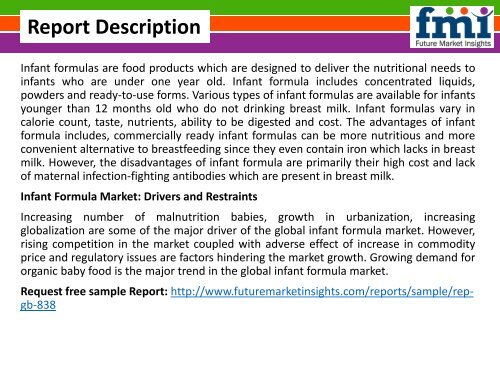Infant Formula Market Volume Analysis, Segments, Value Share and Key Trends 2015-2025
Infant formulas are food products which are designed to deliver the nutritional needs to infants who are under one year old. Infant formula includes concentrated liquids, powders and ready-to-use forms. Various types of infant formulas are available for infants younger than 12 months old who do not drinking breast milk. Infant formulas vary in calorie count, taste, nutrients, ability to be digested and cost. The advantages of infant formula includes, commercially ready infant formulas can be more nutritious and more convenient alternative to breastfeeding since they even contain iron which lacks in breast milk. However, the disadvantages of infant formula are primarily their high cost and lack of maternal infection-fighting antibodies which are present in breast milk.
Infant formulas are food products which are designed to deliver the nutritional needs to infants who are under one year old. Infant formula includes concentrated liquids, powders and ready-to-use forms. Various types of infant formulas are available for infants younger than 12 months old who do not drinking breast milk. Infant formulas vary in calorie count, taste, nutrients, ability to be digested and cost. The advantages of infant formula includes, commercially ready infant formulas can be more nutritious and more convenient alternative to breastfeeding since they even contain iron which lacks in breast milk. However, the disadvantages of infant formula are primarily their high cost and lack of maternal infection-fighting antibodies which are present in breast milk.
Create successful ePaper yourself
Turn your PDF publications into a flip-book with our unique Google optimized e-Paper software.
Report Description<br />
<strong>Infant</strong> formulas are food products which are designed to deliver the nutritional needs to<br />
infants who are under one year old. <strong>Infant</strong> formula includes concentrated liquids,<br />
powders <strong>and</strong> ready-to-use forms. Various types of infant formulas are available for infants<br />
younger than 12 months old who do not drinking breast milk. <strong>Infant</strong> formulas vary in<br />
calorie count, taste, nutrients, ability to be digested <strong>and</strong> cost. The advantages of infant<br />
formula includes, commercially ready infant formulas can be more nutritious <strong>and</strong> more<br />
convenient alternative to breastfeeding since they even contain iron which lacks in breast<br />
milk. However, the disadvantages of infant formula are primarily their high cost <strong>and</strong> lack<br />
of maternal infection-fighting antibodies which are present in breast milk.<br />
<strong>Infant</strong> <strong>Formula</strong> <strong>Market</strong>: Drivers <strong>and</strong> Restraints<br />
Increasing number of malnutrition babies, growth in urbanization, increasing<br />
globalization are some of the major driver of the global infant formula market. However,<br />
rising competition in the market coupled with adverse effect of increase in commodity<br />
price <strong>and</strong> regulatory issues are factors hindering the market growth. Growing dem<strong>and</strong> for<br />
organic baby food is the major trend in the global infant formula market.<br />
Request free sample Report: http://www.futuremarketinsights.com/reports/sample/repgb-838
















